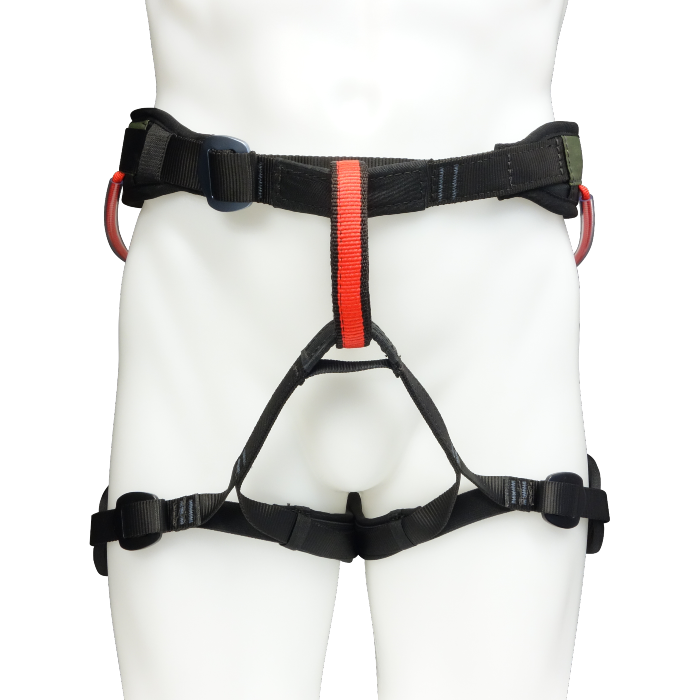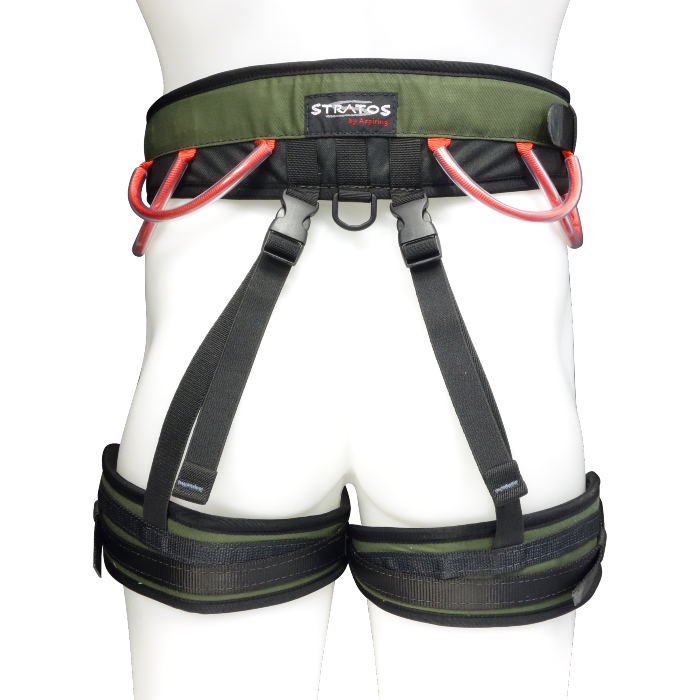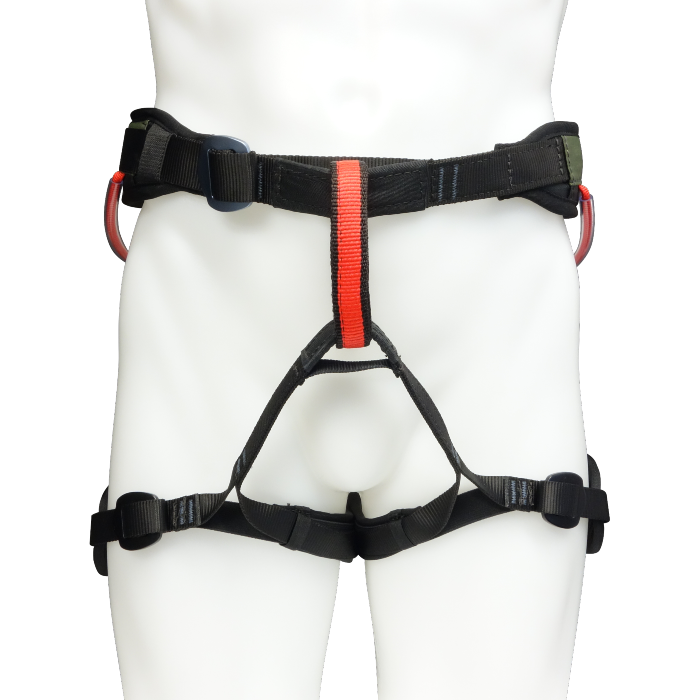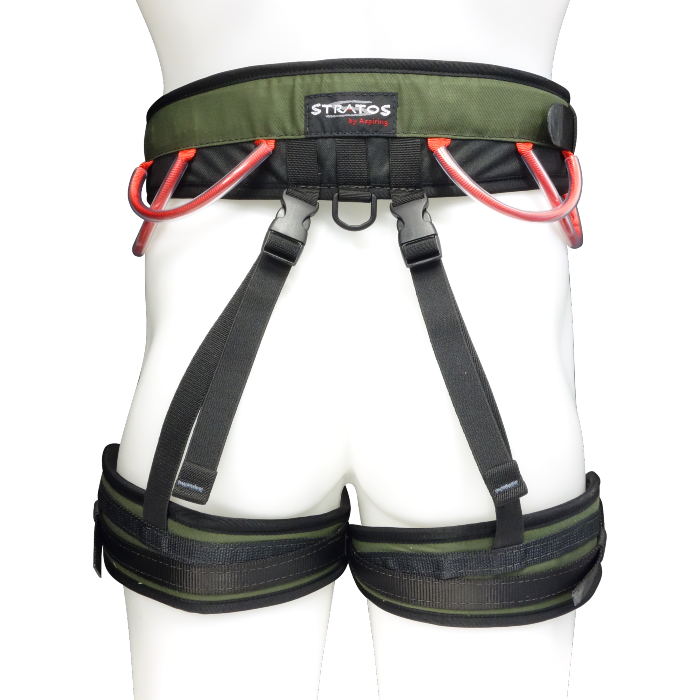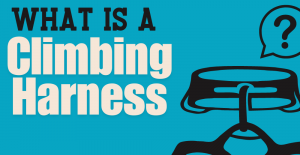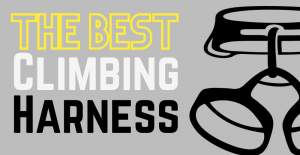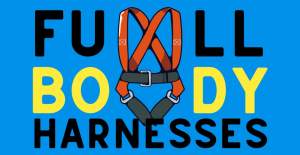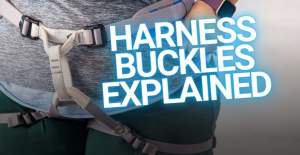A pictoral representation of UIAA-105 and EN-12277 standards for harnesses.
Stratos
Description
Our premium climbing and mountaineering harness with adjustable leg loops and contoured waist & leg padding.
- Ergonomically shaped leg padding to minimise harness bulk between legs.
- Weight in leg loops is distributed through two webbing straps for extra comfort and support.
- Thread back buckles on waist and legs to prevent slippage.
- Fully adjustable leg loops with elastic to promote full range of hip movement.
- Wear points are protected by webbing not fabric.
- High-density New Zealand-made foam in leg loops and waist belt.
Retail price
When you click a link below and then checkout online, no matter what you buy (climbing gear or not), we get a small commission that helps us keep this site up-to-date. Thanks!
Weight (g)  WeightIn grams, the weight, as stated by the manufacturer/brand. If there are differences in weight (due to multiple sizes or optional accessories) we'll list them here. The default weight is the middle-most size, often this is size M. | 425 g |
| Fit | Unisex |
| Sizes | XS, S, M, L, XL, XXL |
Gear Loops  Number of Gear LoopsGear loops are used to hold gear (quickdraws, cams, etc) onto your harness. 4 gear loops is most common. 
0 - 1 Gear LoopsMost often on full body harnesses or guide/gym style harnesses. 2-3 Gear LoopsMostly found on lighter harnesses made for [ski] mountaineering or high-end sport climbing where weight is a high priority. 4 - 5 Gear LoopsThe standard/most common number for climbing harnesses. Perfect for sport and trad. More Than 6 Gear LoopsDesigned for long multi-pitch and big wall climbing, found on harnesses made to hold the maximum amount of gear. Worth ConsideringOccasionally, the number of gear loops will change on a harness model depending on the size. There could be 7 gear loops for the med/large but only 5 gear loops for the xsmall/small. In this case we list the highest number for the filters, and then write an explanation on the product page like, “Size S/XS can only fit 5 gear loops.” | 4 Gear loops |
Ice Clip Slots  Ice Clip SlotIce clipper slots are made to fit a carabiner that holds ice screws. These slots are generally only used by ice climbers but there is no disadvantage to having them on your harness. 
Less than 40% of harnesses will have ice clipper slots. And those harnesses will usually have 2 or 4 slots, often located next to, or between, the gear loops. | No, 0 |
| Belay / Tie-In | One Loop |
| Waist Buckle Type | Manual Doubleback |
| Leg Buckle Type | Manual Doubleback |
| Drop Seat | Yes |
Haul Loop  Haul LoopTrad climbers often look for a haul loop as they're intended to haul a rope (second line) or pack (while you climb the chimney). 
A haul loop can also hold shoes or other accessories. Although not the intended use, it is also commonly used to hold a chalk bag. | Yes (0kN) |
| Certification | EN |
| Size Chart | XS
Waist: 60-70 cm / 24-28 in Legs: 40-55 cm / 18-22 in S
Waist: 70-80 cm / 28-31 in Legs: 40-55 cm / 18-22 in M
Waist: 80-90 cm / 31-35 in Legs: 50-60 cm / 20-24 in L
Waist: 90-100 cm / 35-39 in Legs: 55-65 cm / 22-26 in XL (will fit the lower range of XXL) Waist: 100-110 cm / 39-43 in Legs: 60-70 cm / 24-28 in (we converted centimeters to inches) |
No reviews yet.
If you know of a good product video that should be here, let us know, and we'll put it up.
If you're looking for gear videos in general, check out our Vimeo and YouTube channels to see the newest gear.
The UIAA equipment standard provides a baseline for equipment performance in a test lab under controlled conditions on new equipment. Although these test conditions are relevant to the conditions encountered climbing, conditions encountered at the crags and the condition of the equipment are equally important. This recommendation from the UIAA member federation The British Mountaineering Council (BMC) provides vital equipment information that is NOT explicitly addressed in the standard, particularly failure modes of the equipment and recommendations for the use, inspection, maintenance, and retirement of equipment.

